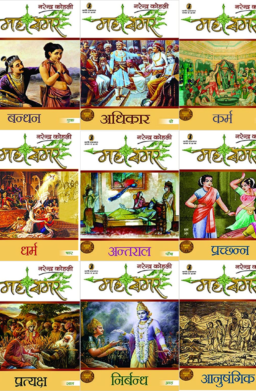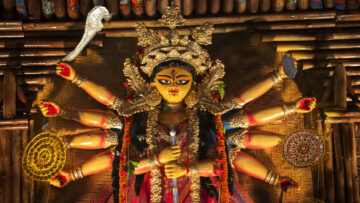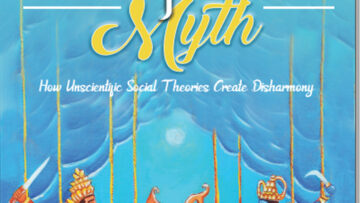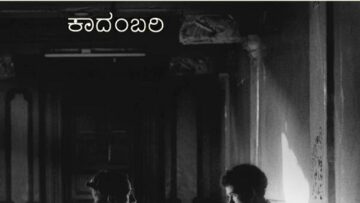“इदं न मम”
(This is not mine)
This life, this action. Nothing is mine. Nothing is for me. My life is for the world. Rest of the universe.
***
This is the unembellished essence of Mahasamar for me. Because, how else to describe a life altering experience such as this? What words could do justice? Is it even possible? My answer is – No. It can’t be done. Life is not supposed to be written, it is to be lived.
Mahasamar is the reinvented, retelling of the Epic – Mahabharat. Written in hindi and spread over more than 4000 pages, Mahasamar is probably the most significant and popular epic novel of our time. The entire series consists of Nine parts. Aside from the eight mentioned above, the ninth part – Anushangik, is Narendra Kohli ji’s retelling of Mahasamar and its creation.
The books follow the widely known and accepted timeline of Mahabharat, beginning with the glory of Hastinapur under the reign of Raja Shantanu and his reunion with his son, and crown prince Devavrat (Bhishm). The story is delivered in a modern (contemporary) prose; highlighting the lives of the countless characters of the Epic and arguing in remarkable detail, their internal dilemmas, their motivations and their expectations. The individual narratives of different characters are interwoven with expert insight into their actions and the subsequent consequences.
Book Reflections at A Glance
To review all eight books individually is a colossal task in and of itself. Therefore, below is a summary of my reading experience with Mahasamar, enumerating the aspects of the books as a whole that I liked and those that I did not.
Positives:
Absolutely everything about the entire series is brilliance in action. The Audiobook narration in Hindi, by the extremely talented narrators Shakti Singh, Vishnu Sharma, and Kamal Sharma, is simply outstanding! I have been listening to audiobooks for about a year, and I have not experienced storytelling of this magnitude. The narration is powerful and awe-inspiring!
Additionally, it is remarkable how certain legends from Mahabharat have been handled to showcase the power of stories. What is the truth? That which we perceive through our senses or something else entirely? What if the perception of our senses is wrong? How do we know what the truth is? At every point in the books, the characters speak to the reader, pulling the reader into the narrative and forcing us to interact with our truth, our prejudice, our shortcomings.
Aside from the major characters – Bhishm pitamah, Pandavs, Kauravas, Dron aacharya, Shri Krishn – there are a multitude of other minor characters that we seldom hear about in pop culture. In Mahasamar, these characters have been brought into the light and given stage space, highlighting their own significance and contributions.
I especially loved Uddhav – (also known as Pavanayadhi), who is a cousin, friend and counsellor to Shri Krishn. He is portrayed in the books as a master storyteller, regaling the womenfolk with his outstanding tales of Shri Krishn’s childhood and his victory over his mama, Kans. (The storyteller within me danced and hummed every time the ladies surrounded Uddhav and asked for a story).
Negatives:
The books (very obviously) lean towards the glorification of the Pandavs. It could be research, it could be hard truth supported by evidence or it could be a direct consequence of confirmation bias from the author’s POV. It is not my place to say.
Of course, this is a negative only if you, like me, prefer a more balanced story. Maybe the Pandavs were glorious to a fault. Maybe they were as righteous and emblematic of the good in all of us as they are portrayed to be. I am not denying it. I cannot deny it. I am woefully ill informed to make any sort of comments like that.
However, if considered purely as a story, shades of grey in the characters are more relatable than outright black or white. The books describe certain aspects of Pandavs that lie in that grey spectrum. So, my contention is, why the Kauravas could not have possessed some shades of white? A human being is a combination of both light and dark. And, as a result, the portrayal of Karn in these books, leaves me with a bad taste.
Again, it could be my own conviction of rooting for the underdog, or my own compass of the morality of right and wrong that makes me say this. Perhaps, Karn was indeed such a person as the books describe, but my heart wants him to be good. Ironic, isn’t it, that I am a victim of my own confirmation bias? (Mrutyunjay by Shivaji Sawant is the balm that my soul needs right now!).
***
I have been meaning to read Mahabharat for a long time. However, I have been thwarted time and again, either by my lack of understanding of Sanskrit and Hindi and my unwillingness to succumb to translations in English; or at other times, by the sheer pace of life itself.
Mahasamar became available as Hindi Audiobooks on Storytel app back in March of this year, and it was too good an opportunity to miss. I am glad (and a little proud) that I went for the Hindi versions rather than the translations or other derivative English texts. Reading in Hindi has brought me closer to really appreciating the nuances of my mother tongue. In addition, I have absorbed a treasure trove of Hindi vocabulary!
Now, after finishing the eight books over the span of two months, I truly realize how much of authenticity and meaning is lost in translation. For example – Did you know that the word Dharm (Sanskrit: धर्म) is not interchangeable with the word ‘religion’? (I didn’t!)
धर्म is not Hinduism, Islam, or Christianity or any other religion. धर्म signifies behaviours that make life and the universe possible. It includes duties, rights, laws, conduct, virtues that enable a guideline for the right way of living. It signifies righteousness. Knowing this, do you realize how this impacts our understanding of the Dharmyuddh (धर्मयुद्ध) in Kurukshetra? Why was it fought, what was its significance? How does it come into play in our lives today? And, how does it change our understanding of life?
And, this is just an extremely superficial nugget of the wealth of knowledge that awaits us in Mahasamar.
Listening to Mahasamar has been a truly wonderful experience for me. In these times of utter chaos and tragedy, these books have been an unexpected source of comfort and spiritual awakening.
Why? Because I read Mahasamar with my family. The books led to questions, discussions and debates, which in turn pushed us to seek out the answers, employing all our mental and spiritual faculties in a sort of quest for knowledge, for understanding and growth. At a time when even the closest of relationships cannot bear the strain of being cooped up in each other’s company, Mahasamar gave us a common ground to build our conversations on, and brought us closer to a higher plane of understanding.
And, even if we choose to disregard everything that Mahabharat stands for and its significance in our lives. Even then, the absolute magnificence of Mahasamar (Mahabharat) as a story; a supremely fascinating tale of Kings and Queens and the earth shattering rumblings of their lives and deaths, cannot be discarded.
A Word To The Uninitiated.
For someone who is a self proclaimed atheist, ‘progressive’ and well read intellectual, reading Mahasamar in its entirety, is a huge achievement for me. Not to mention that this is my very first foray into the realms of Puranic fiction.
As a newbie, my advice is to step into this book, this world, this theology, with open arms and open minds. At any point during the books, where you, your mind or the years of sociological conditioning scream at you – this is not how it happened! – I urge you to overcome the impulse of rebellion, push it aside, with force if need be, and carry on, unperturbed, un-maligned, unprejudiced.
We do not know how it happened. We were not there. What we know is a result of a combination of multiple aspects that constitute our birth, our education and our life in this beautiful country. What we know is what we have read, watched, been taught, consumed and accepted as the Truth. Is it the truth? We don’t know.
One of the primary objectives and essence of Mahasamar, as far as I have been able to adjudge and reflect, is to make us think – it could have been. To accept this version of the tale as logical or to reject it as irrational is our onus as readers. The author is not telling us – this is how it actually happened! No. He is telling us – this is how it might have happened. What do you think?
***
If you have not read these books, if you have been thinking about reading the Mahabharat, if you understand Hindi, I implore you to give these audiobooks a whirl! Mahasamar is a good first step for those looking to study the Puranas or Puranic fiction.
***
About the Author:
Wikipedia gives a bare bones description of Narendra Kohli ji and his life’s work. Detailing just the factual details of his education and a list of the countless stories and books he published throughout his writing career.
“Writing in Hindi-language, he is credited with reinventing the ancient form of epic writing in modern prose. He is also regarded as a trendsetter in the sense that he pioneered the creation of literary works based on the Puranas. Because of the large impact of his body of work on Hindi literature, this era of contemporary modern Hindi literature, since about 1975, is sometimes referred to as the Kohli Era.”
It is nothing short of a tragedy that I have come too late to Kohli ji and his works. Shri Narendra Kohli ji passed away on 17th April due to complications related to COVID-19. The laying down of his pen is a huge blow and an irreparable loss to Indian literature. May his atma attain sadgati. If there is such a thing as heaven or an afterlife, I send my prayers and my gratitude for these books.
The entire series is available here for purchase.
The first of the audio books referenced by the author of the review may be found here.
Disclaimer: The opinions expressed in this article belong to the author. Indic Today is neither responsible nor liable for the accuracy, completeness, suitability, or validity of any information in the article.







